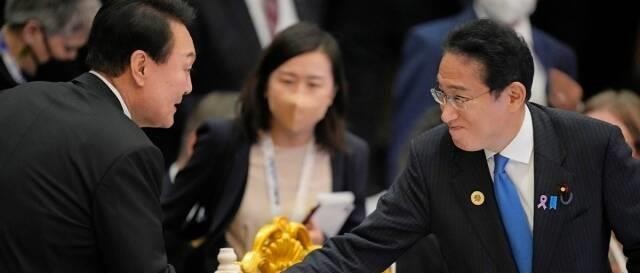Description

Disclaimer: Copyright infringement not intended.
Context: Japan and South Korea agreed to resume regular visits between their leaders and take steps to resolve a trade dispute during a highly anticipated summit in Tokyo, in what Japan’s Prime Minister called a “big step” to rebuild the two nations’ security and economic ties as they try to overcome a century of difficult history.
Details:
- The summit could revise the strategic map of northeast Asia.
- The two U.S. allies, who have long often been at odds over their history, are seeking to form a united front, driven by shared concerns about a restive North Korea and a more powerful China.
- The countries had agreed to resume defence dialogue and vice-ministerial strategic talks, while also restarting a process of trilateral communication among Japan, South Korea and China.
- The ever-escalating threat of North Korea’s nuclear missile program poses a huge threat to peace and stability not only in East Asia but also to the international community.
.jpeg)
What are the issues?
- Japan effectively colonized the Korean Peninsula between 1910 and 1945, in a regime that imposed Japanese names and language on Koreans and conscripted many into forced labor or forced prostitution in military brothels before and during World War II.
- Japan paid $800 million in reparations to South Korea’s military-run government in 1965, but this money was never distributed to victims.
- A semi-government fund offered compensation to former “comfort women” when the government apologized in 1995, but many South Koreans believe that the Japanese government must take more direct responsibility for the occupation.
- The two sides also have a longstanding territorial dispute over a group of islands controlled by South Korea and claimed by Japan.
Efforts to renew ties:
- Seoul and Tokyo have attempted to establish better ties before.
- In 2004, leaders began regular visits, but these ended in 2012 after South Korean President Lee Myung-bak visited the disputed islands.
- Tensions escalated in the past 10 years as conservative Japanese governments moved to rearm the country while stepping up attempts to whitewash Japan’s wartime atrocities, and in 2018 South Korea’s Supreme Court ordered Japan’s Nippon Steel and Mitsubishi Heavy Industries to compensate forced labor victims.
- In 2019, Japan, in apparent retaliation, placed export controls on chemicals used to make semiconductors and displays used in smartphones and other high-tech devices.

What’s at stake for the region?
- Improved ties between South Korea and Japan could pave the way for the two U.S. allies to cooperate more closely on shared security concerns related to China and North Korea.
- Washington is eager to get its allies on the same page, and appears to have worked intensively to bring about the summit.
- While Japan increasingly bolstered defense ties with the U.K., Australia, India and the Philippines, challenges in Japan-South Korea relations were obvious and their closer relationship “in the larger context of our strategic alignment … is a very big deal.”
|
PRACTICE QUESTION
Q) Renewed Japan-South Korea relations could revise the strategic map of northeast Asia. Analyse. (150 words)
|

https://epaper.thehindu.com/ccidist-ws/th/th_delhi/issues/28898/OPS/GAFB0F9MV.1+GE0B0FQ7G.1.html






.jpeg)







